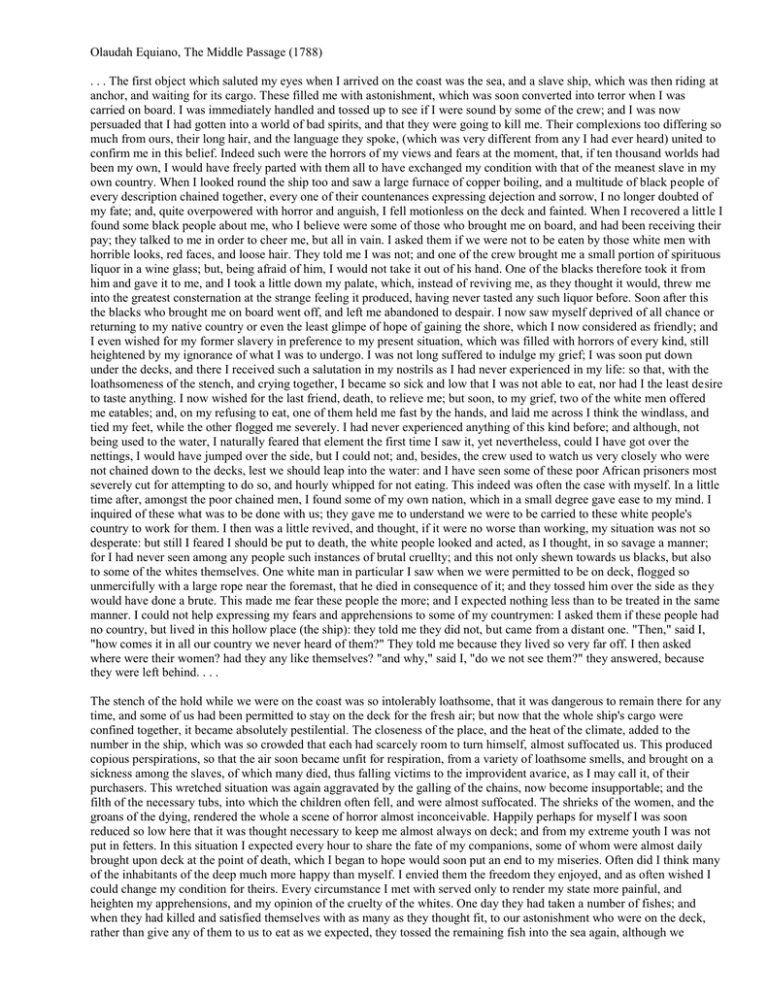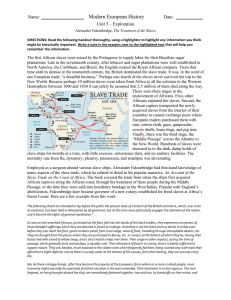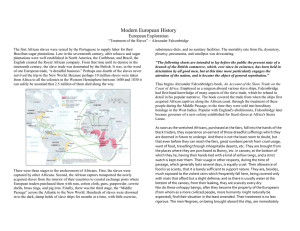Olaudah Equiano, The Middle Passage (1788)
advertisement

Olaudah Equiano, The Middle Passage (1788) . . . The first object which saluted my eyes when I arrived on the coast was the sea, and a slave ship, which was then riding at anchor, and waiting for its cargo. These filled me with astonishment, which was soon converted into terror when I was carried on board. I was immediately handled and tossed up to see if I were sound by some of the crew; and I was now persuaded that I had gotten into a world of bad spirits, and that they were going to kill me. Their complexions too differing so much from ours, their long hair, and the language they spoke, (which was very different from any I had ever heard) united to confirm me in this belief. Indeed such were the horrors of my views and fears at the moment, that, if ten thousand worlds had been my own, I would have freely parted with them all to have exchanged my condition with that of the meanest slave in my own country. When I looked round the ship too and saw a large furnace of copper boiling, and a multitude of black people of every description chained together, every one of their countenances expressing dejection and sorrow, I no longer doubted of my fate; and, quite overpowered with horror and anguish, I fell motionless on the deck and fainted. When I recovered a little I found some black people about me, who I believe were some of those who brought me on board, and had been receiving their pay; they talked to me in order to cheer me, but all in vain. I asked them if we were not to be eaten by those white men with horrible looks, red faces, and loose hair. They told me I was not; and one of the crew brought me a small portion of spirituous liquor in a wine glass; but, being afraid of him, I would not take it out of his hand. One of the blacks therefore took it from him and gave it to me, and I took a little down my palate, which, instead of reviving me, as they thought it would, threw me into the greatest consternation at the strange feeling it produced, having never tasted any such liquor before. Soon after this the blacks who brought me on board went off, and left me abandoned to despair. I now saw myself deprived of all chance or returning to my native country or even the least glimpe of hope of gaining the shore, which I now considered as friendly; and I even wished for my former slavery in preference to my present situation, which was filled with horrors of every kind, still heightened by my ignorance of what I was to undergo. I was not long suffered to indulge my grief; I was soon put down under the decks, and there I received such a salutation in my nostrils as I had never experienced in my life: so that, with the loathsomeness of the stench, and crying together, I became so sick and low that I was not able to eat, nor had I the least desire to taste anything. I now wished for the last friend, death, to relieve me; but soon, to my grief, two of the white men offered me eatables; and, on my refusing to eat, one of them held me fast by the hands, and laid me across I think the windlass, and tied my feet, while the other flogged me severely. I had never experienced anything of this kind before; and although, not being used to the water, I naturally feared that element the first time I saw it, yet nevertheless, could I have got over the nettings, I would have jumped over the side, but I could not; and, besides, the crew used to watch us very closely who were not chained down to the decks, lest we should leap into the water: and I have seen some of these poor African prisoners most severely cut for attempting to do so, and hourly whipped for not eating. This indeed was often the case with myself. In a little time after, amongst the poor chained men, I found some of my own nation, which in a small degree gave ease to my mind. I inquired of these what was to be done with us; they gave me to understand we were to be carried to these white people's country to work for them. I then was a little revived, and thought, if it were no worse than working, my situation was not so desperate: but still I feared I should be put to death, the white people looked and acted, as I thought, in so savage a manner; for I had never seen among any people such instances of brutal cruellty; and this not only shewn towards us blacks, but also to some of the whites themselves. One white man in particular I saw when we were permitted to be on deck, flogged so unmercifully with a large rope near the foremast, that he died in consequence of it; and they tossed him over the side as they would have done a brute. This made me fear these people the more; and I expected nothing less than to be treated in the same manner. I could not help expressing my fears and apprehensions to some of my countrymen: I asked them if these people had no country, but lived in this hollow place (the ship): they told me they did not, but came from a distant one. "Then," said I, "how comes it in all our country we never heard of them?" They told me because they lived so very far off. I then asked where were their women? had they any like themselves? "and why," said I, "do we not see them?" they answered, because they were left behind. . . . The stench of the hold while we were on the coast was so intolerably loathsome, that it was dangerous to remain there for any time, and some of us had been permitted to stay on the deck for the fresh air; but now that the whole ship's cargo were confined together, it became absolutely pestilential. The closeness of the place, and the heat of the climate, added to the number in the ship, which was so crowded that each had scarcely room to turn himself, almost suffocated us. This produced copious perspirations, so that the air soon became unfit for respiration, from a variety of loathsome smells, and brought on a sickness among the slaves, of which many died, thus falling victims to the improvident avarice, as I may call it, of their purchasers. This wretched situation was again aggravated by the galling of the chains, now become insupportable; and the filth of the necessary tubs, into which the children often fell, and were almost suffocated. The shrieks of the women, and the groans of the dying, rendered the whole a scene of horror almost inconceivable. Happily perhaps for myself I was soon reduced so low here that it was thought necessary to keep me almost always on deck; and from my extreme youth I was not put in fetters. In this situation I expected every hour to share the fate of my companions, some of whom were almost daily brought upon deck at the point of death, which I began to hope would soon put an end to my miseries. Often did I think many of the inhabitants of the deep much more happy than myself. I envied them the freedom they enjoyed, and as often wished I could change my condition for theirs. Every circumstance I met with served only to render my state more painful, and heighten my apprehensions, and my opinion of the cruelty of the whites. One day they had taken a number of fishes; and when they had killed and satisfied themselves with as many as they thought fit, to our astonishment who were on the deck, rather than give any of them to us to eat as we expected, they tossed the remaining fish into the sea again, although we begged and prayed for some as well as we could, but in vain; and some of my countrymen, being pressed by hunger, took an opportunity, when they thought no one saw them, of trying to get a little privately; but they were discovered, and the attempt procured them some very severe floggings. . . . . . . I and some few more slaves, that were not saleable amongst the rest, from very much fretting, were shipped off in a sloop for North America. . . . While I was in this plantation [in Virginia] the gentleman, to whom I suppose the estate belonged, being unwell, I was one day sent for to his dwelling house to fan him; when I came into the room where he was I was very much affrighted at some things I saw, and the more so as I had seen a black woman slave as I came through the house, who was cooking the dinner, and the poor creature was cruelly loaded with various kinds of iron machines; she had one particularly on her head, which locked her mouth so fast that she could scarcely speak; and could not eat nor drink. I was much astonished and shocked at this contrivance, which I afterwards learned was called the iron muzzle . . . An Eyewitness Describes the Slave Trade in Guinea (c. 1700) Captain Willem Bosman The transatlantic slave trade remains one of the great tragedies of world history. This horrific trade in human beings is richly described by the Dutch sea captain Willem Bosman; his description provides us with a detailed account of how this trade was conducted in the West African state of Guinea. Not a few in our country fondly imagine that parents here sell their children, men their wives, and one brother the other. But those who think so, do deceive themselves; for this never happens on any other account but that of necessity, or some great crime; but most of the slaves that are offered to us, are prisoners of war, which are sold by the victors as their booty. When these slaves come to Fida, they are put in prison all together; and when we treat concerning buying them, they are all brought out together in a large plain; where, by our surgeons, whose province it is, they are thoroughly examined, even to the smallest member, and that naked both men and women, without the least distinction or modesty. The invalids and the maimed being thrown out, as I have told you, the remainder are numbered, and it is entered who delivered them. In the meanwhile, a burning iron, with the arms or name of the companies, lies in the fire, with which ours are marked on the breast. This is done that we may distinguish them from the slaves of the English, French, or others (which are also marked with their mark), and to prevent the Negroes exchanging them for worse, at which they have a good hand. I doubt not but this trade seems very barbarous to you, but since it is followed by mere necessity, it must go on; but we yet take all possible care that they are not burned too hard, especially the women, who are more tender than the men. We are seldom long detained in the buying of these slaves, because their price is established, the women being one fourth or fifth part cheaper than the men. The disputes which we generally have with the owners of these slaves are, that we will not give them such goods as they ask for them, especially the boesies [cowry shells] (as I have told you, the money of this country) of which they are very fond, though we generally make a division on this head, in order to make one part of the goods help off another; because those slaves which are paid for in boesies, cost the company one half more than those bought with other goods. When we have agreed with the owners of the slaves, they are returned to their prison; where, from that time forwards, they are kept at our charge, cost us two pence a day a slave; which serves to subsist them, like our criminals, on bread and water: so that to save charges, we send them on board our ships with the very first opportunity, before which their masters strip them of all they have on their backs; so that they come to us stark-naked, as well women as men: in which condition they are obliged to continue, if the master of the ship is not so charitable (which he commonly is) as to bestow something on them to cover their nakedness. You would really wonder to see how these slaves live on board; for though their number sometimes amounts to six or seven hundred, yet by the careful management of our masters of ships, they are so [well] regulated, that it seems incredible. And in this particular our nation exceeds all other Europeans; for as the French, Portuguese, and English slave-ships are always foul and stinking; on the contrary, ours are for the most part clean and neat. The slaves are fed three times a day with indifferent good victuals, and much better than they eat in their own country. Their lodging place is divided into two parts; one of which is appointed for the men, the other for the women, each sex being kept apart. Here they lie as close together as it is possible for them to be crowded.



